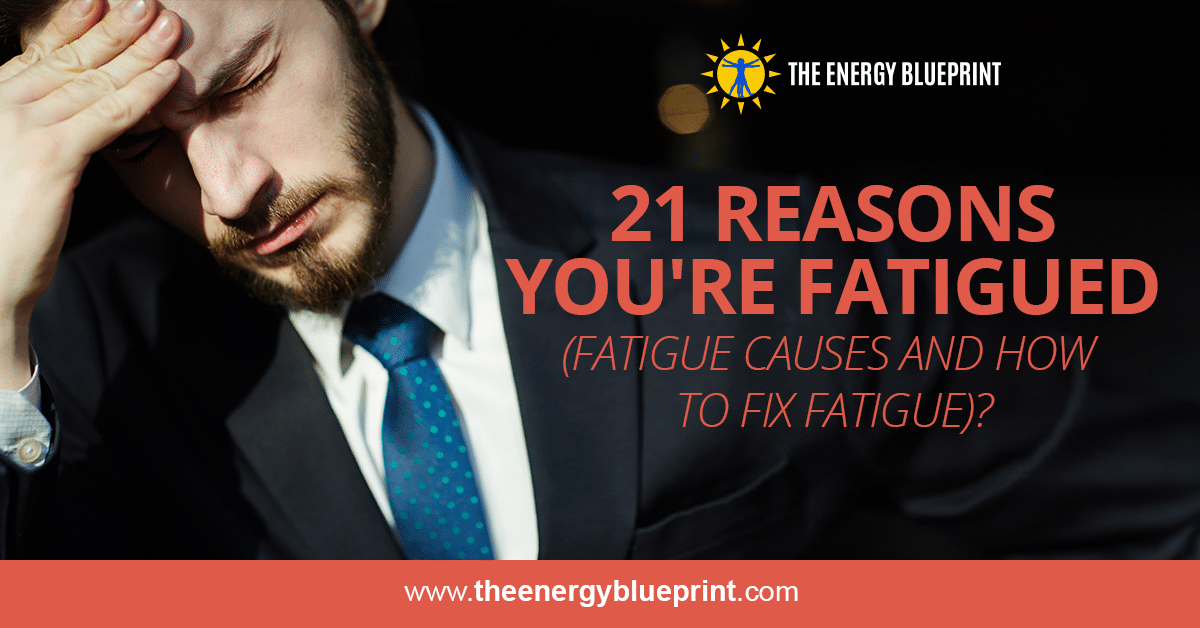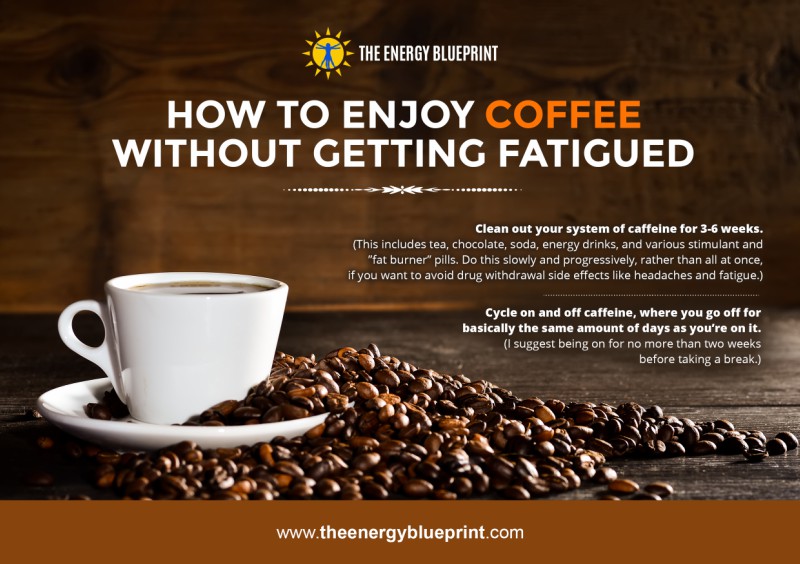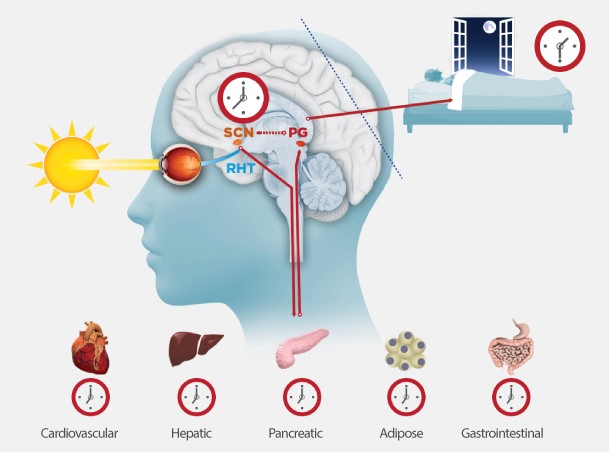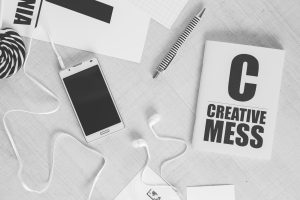 Sick of being tired? Wondering why you’re tired all the time? Here are 21 of the most common fatigue causes and several powerful strategies on how to fix fatigue.
Sick of being tired? Wondering why you’re tired all the time? Here are 21 of the most common fatigue causes and several powerful strategies on how to fix fatigue.
Today we have a massive epidemic of fatigue and exhaustion. Chronic fatigue, daytime sleepiness, stress, anxiety, depression, exhaustion, and chronic lack of energy have become epidemics in our society. The latest research shows that nearly 1 in 3 doctor’s visits is now due to general fatigue and lack of energy!
That’s a huge problem.
Why?
Because energy is at the core of everything we do in life. Without enough energy, everything in your life suffers — your health, your career, and your relationships.
It’s time to reclaim your energy and start functioning at a higher level in everything you do in life.
In this article, I am going to show you the 21 most common reasons why people become fatigued as well as how to take action today to overcome fatigue and build a body (and a life) filled with energy.
1. Your Daily Cup Of Coffee Is Making You Feel Tired All The Time
 One of the major causes of tiredness is the daily cup of coffee, unfortunately. This might seem very counter-intuitive as caffeine is known to provide a buzz of energy, but it turns out that when you drink coffee daily, it doesn’t give you energy — it’s actually wrecking your energy. And this is an insidious process because while it’s wrecking your energy, it’s actually making you believe that it’s giving you energy. [1]
One of the major causes of tiredness is the daily cup of coffee, unfortunately. This might seem very counter-intuitive as caffeine is known to provide a buzz of energy, but it turns out that when you drink coffee daily, it doesn’t give you energy — it’s actually wrecking your energy. And this is an insidious process because while it’s wrecking your energy, it’s actually making you believe that it’s giving you energy. [1]
To understand caffeine, you first need to understand a neurotransmitter in the brain called adenosine. Adenosine is an “inhibitory neurotransmitter” in the brain — that means that it makes you tired, relaxed and sleepy. In fact, adenosine is one of the major signals telling your brain it’s time to go to sleep at night. So think of it like this: When the adenosine molecules plug into the receptors for adenosine in the brain, that triggers you to feel tired and low on energy.
So what does adenosine have to do with caffeine?
Simple: Caffeine actually exerts its effects on the brain (you know, feeling awake and energetic) by working on the adenosine receptors. But it works in the opposite way as adenosine does. When adenosine fits into the adenosine receptors, it makes you fatigued and sleepy. But when caffeine hits it, what it does is actually block the adenosine from getting in! So it prevents you from feeling the effects of adenosine.
In other words, caffeine blocks the neurotransmitter (adenosine) that would normally be making you feel sleepy and low on energy. By blocking the fatiguing effects of adenosine, it creates a stimulant effect that energizes you.
That sounds good so far, right? It sounds like caffeine is a great way to energize your brain and body. And it is! But, here’s the big problem: this only works in the short-term!
When you consume caffeine every day, your brain doesn’t like the fact that you’re constantly blocking adenosine, so it begins to fight back! This causes two (really bad) effects:
- When the caffeine effect wears off many hours later, the adenosine comes back with vengeance and you will experience even more tiredness. Now, if you think you can combat that by just drinking more cups of coffee, well, that will work for a while, but here’s the even bigger problem…
- When you consume it daily, your brain senses that it’s being chronically overstimulated and senses the shortage of adenosine (due to caffeine blocking it), so it actually increases the amount of adenosine and adenosine receptors in the brain. That is bad news because what it does is lower your normal baseline levels of energy, mood, and performance. And it makes you dependent on caffeine just to get back up to a normal level of function. Which is causing you to feeling sleepy all the time.
That’s the big key that almost every coffee drinker is totally unaware of: Even though you think that your daily coffee is giving you a great boost of energy, what you don’t realize is that you’re actually just getting a boost back up to what used to be your normal level of energy and performance!
In other words, the coffee has actually lowered your normal baseline level of energy, mood, and performance — that’s why you wake up tired and groggy and rush to get your caffeine in — and you’ve made yourself dependent on caffeine just to function normally. In short, while most people think that their daily coffee habit is helping them function, it’s actually sabotaging their mood, performance and energy levels and created a drug-like dependence just to be able to get back and function normally.
How To Consume Coffee So You Don’t End Up Feeling Sleepy All The Time
So, how can you get the benefits without lowering your baseline mood performance and energy and while even getting a real boost from your coffee?
Luckily, the answer is simple, cycle on and off caffeine. Use it for one or two days, and then take two to three days off of it. Or use it for two weeks and then go off for two weeks.
However, in the beginning, it is not quite that simple. First, you need to clean out your system and reset your entire neurotransmitter system in your brain if you have been a chronic caffeine consumer.
Like I said before, when you drink it every day your brain makes negative adaptations in those neurotransmitter systems which leads to caffeine fatigue. To undo those negative adaptations, and increase your baseline level of energy and performance you have to do something that is going to feel really hard for a lot of people.
You have to give your brain a complete break from caffeine for several weeks. I recommend at least three weeks completely off caffeine, but five to six weeks is optimal.

Basically, what you want to do is this:
- Step 1 – Clean out your system of caffeine for 3-6 weeks. (Do this slowly and progressively, rather than all at once, if you want to avoid drug withdrawal side effects like headaches and fatigue.)
- Step 2 – Cycle on and off caffeine, where you go off for basically the same amount of days as you’re on it. I suggest being on for no more than two weeks before taking a break.
If caffeine lowers baseline energy and mood, why am I telling people to still use it? Simple: Remember all those health benefits I told you are associated with drinking coffee? That’s why!
This is how to get all the benefits of coffee for your health, with none of the drawbacks on your energy!
(Side note: If you would like to understand the science on how caffeine damages your energy levels more in-depth, we have another article on exactly how coffee makes people tired and fatigued.)
2. Blue Light In The Evening Is Making It Harder To Fall Asleep
 Blue light? What the heck? How could light affect my energy levels? To understand this one, you first need to understand a concept called the circadian rhythm. The circadian rhythm is your body’s 24–hour biological clock that controls when you are awake and when you sleep. And it also controls a whole orchestra of hormones and neurotransmitters that regulate everything from your metabolism to your hunger, to your mood, to your mental and physical performance, to your energy levels.
Blue light? What the heck? How could light affect my energy levels? To understand this one, you first need to understand a concept called the circadian rhythm. The circadian rhythm is your body’s 24–hour biological clock that controls when you are awake and when you sleep. And it also controls a whole orchestra of hormones and neurotransmitters that regulate everything from your metabolism to your hunger, to your mood, to your mental and physical performance, to your energy levels.
In fact, a disrupted circadian rhythm is one of the most common causes of tiredness and lack of energy.
The most important spectrum of light when discussing circadian rhythm is blue light, which you have plenty of feeding back into your circadian clock in your brain whenever you go outside and look up into the sunny blue sky.
In contrast, after the sun goes down and blue light stops entering our eyeballs (as it did for millions of years prior to the invention of electricity), your brain also responds to the lack of blue light feeding back into the brain. How? The part of the brain that controls our circadian rhythm starts working towards rest. It works like this, the Suprachiasmatic nucleus, or SCN, for short sends this “no blue light” stimulus to the pineal gland. The pineal gland is the part of the brain that is responsible for melatonin production in the brain. The pineal gland starts producing the hormone melatonin which is a sleep and wakefulness regulator. This process starts putting the body into the physiological state of sleep.

In the modern day world, artificial light sources, like TVs, cell phones, and computer screens, emit light in the blue light spectrum, which enters your eyes and feeds back into the brain where it tells the brain “it’s daytime,” and as a result, melatonin is suppressed.
This is a good thing during the middle of the day, but a pretty terrible thing when we have lots of blue light entering our eyes after sunset. Normally, when the sun goes down, melatonin goes up, and we get tired and ready for sleep. Due to modern artificial light sources, however, we have blue light pouring into our eyes for hours after sunset, and this completely throws off our circadian clock. This is a totally unnatural situation that our ancestors never had to deal with for millions of years up until just the last couple centuries (and especially just the last few decades with computers, TVs, cell phones and fluorescent indoor lighting).
Numerous studies have found that exposure to regular room light during normal hours of sleep, melatonin is reduced by 50%! Thus directly impacting on your sleep and energy levels negatively. [2]
How To Fix Fatigue By Optimizing Circadian Rhythm
If you want great energy levels, you simply must optimize your circadian rhythm. The exposure to blue light wavelengths after dark is causing your body to confuse night with day and is chronically lowering your energy. To minimize your exposure to blue light you can install f.lux software on your computer and wear blue blocking glasses. [3]
(Quick sidenote: If you’re someone who constantly feels tired and fatigued, and you’d like to learn the most cutting-edge science to increase your energy levels… for FREE… then enter your email in the box below to sign up for our FREE Energy Blueprint Video Masterclass. It’s PACKED with life-transforming science that can literally double or triple your energy levels. Just enter your email in the box below.)
3. Late Night Snacking Causes Fat Gain And Poor Energy
 The research is clear, eating too late can impair your energy levels, make you feeling tired all the time (and also subtly shift your body towards fat gain).
The research is clear, eating too late can impair your energy levels, make you feeling tired all the time (and also subtly shift your body towards fat gain).
When you eat late your body has a very short time to convert the food you have eaten over the cause of the day and thus shortening the autophagy process your body needs to recycle the used and broken cells. Autophagy is the recycling process of damaged and dysfunctional cell parts that happens each night.
In essence, if you keep eating from you get out of bed and until you go to sleep you are hindering this process and you are functioning tomorrow on today’s worn out, broken down cell parts. This has a direct impact on your energy levels.
In a new study, the researchers used a smartphone app to monitor the feeding patterns in Americans. What they found was stunning:
- Most people have a daily feeding window (from the first bite of food to the last bite of food) of 15 hours or longer. That means that people were not eating food during only 8 or 9 hours of the day.
- Most people consume a huge portion of calories at dinner time after 6 pm.
- The general fasting window is 8-9 hours, and basically, the only time people weren’t eating food was while they were in bed
In short, they found that people are eating almost all the time, and the only time that they weren’t consuming food was almost literally just the time they were in bed. In case it needs stating, this is not the way we humans are designed to eat. And there’s much research to show that too long of feeding windows and too short of fasting windows each night is related to all sorts of health problems, from diabetes to certain types of cancer, to obesity, to fatigue, and even to shortened length of life. In short, late night snacking is one of the main causes of tiredness. The main reasons why are that it disrupts the body’s circadian rhythm and also impairs the process of autophagy (the recycling of damaged and dysfunctional cell parts that happen each night).
How Not To Be Tired – What A Fasting Window Of 12-14 Hours Does To Your Health And Energy
But here’s the really interesting part: The researchers then did an intervention with these people to see what would happen if they changed their eating schedule. When the participants changed their feeding window to 10-11 hours the results were amazing. Even without changing what foods these people were eating at all or asking them to change how much food they eat — only changing their eating schedule — participants:
- Lost fat
- Slept better
- Increased their energy level. [4]
All of that, just from this simple shift in eating schedule.
In short, eating late at night is forcing your body to constantly run on an empty battery. Make sure you allow your cells to regenerate and recharge your battery by making dinner be your last meal of the day. Perhaps also consider having an earlier dinner if you normally eat very close to bedtime. Addressing your late-night eating habit won’t result in a huge difference in energy and fat loss overnight, but if you apply it consistently, it’s very powerful.
4. You Do Not Have A Fixed Bedtime Ritual
“Sleep is not an on-off switch. It’s more like slowly easing your foot off the gas.” – Dr. Michael Breus, Ph.D. (”The Sleep Doctor”)
Most of us run around all day like chickens with their heads cut off — constantly busy and trying to do a thousand things — and then wonder why we can’t fall right asleep as soon as our head hits the pillow. If our nervous system has been in overdrive for 16 hours, it’s unrealistic to assume that it can switch into low gear in a matter of minutes simply because we want it to. Of course, this is why sleeping pills are growing in popularity each year. There is a growing epidemic of insomnia, and that’s actually just the tip of the iceberg, because, for every person who has overt insomnia, there are probably many others suffering from chronically poor sleep.
One of the best things you can do to remedy this situation is to establish a pre-bed wind-down ritual. Before you expect to sleep, it must be clear to your body “now is not the time for thinking and activity; now is the time for rest and sleep.”
In traditional societies, when the night time arrives, it’s time to eat the final meal of the day and then enjoy the night being social with others, telling stories, or reading a book. There is a window of several hours for separating oneself from the stressors of the day and preparing for rest and rejuvenation. But with artificial light that lengthens our days and with technology that never sleeps, many of us miss out on this critical separation time.
When you do not take time daily to wind down before bed, your body will not get the proper signal to shut down the areas of the brain associated with thinking and planning, and begin the process to enter into sleep.
How To Fix Fatigue – An Easy Way To Set Up Your Pre-Bed Ritual
Making a simple pre-bed ritual that includes something fun and relaxing (being social, playing board games, journaling, watching a movie with a loved one, having sex, reading a book, etc.) can be a powerful way to shift your brain out of “go” mode and send your brain the signal that it’s time for “sleep” mode.
5. You Are Starting Your Day Setting Yourself Up For Stress And Feeling Tired All The Time

A morning routine sets the tone for the whole day, and if you do each day right, you’ll do life right. A morning routine is not only critical for lifetime success, it is critical for setting the energetic and mood tone for the rest of the day.
If you experiment with this a little and pay attention to the results, you’ll notice that your mood, energy, and productivity are all massively affected by how you start the first 30-60 minutes of the day. If you start by rushing into checking emails, or checking comments on social media, or checking text messages, or just starting the day without setting any clear intentions for the day and consciously cultivating the right mindset and emotional state, your days are probably going to be pretty BLAH!
But when you start with 20-60 minutes of connecting with your goals and values, intensive brain training (for example, meditation, prayer, gratitude, neurofeedback, mindfulness or concentration practices) and setting intentions and concrete plans for what you want to do that day, it creates AWESOME days.
While there aren’t any formal scientific studies on this subject, dozens of authors who study the habits of the most successful people in the world consistently report that one of their biggest commonalities is a morning ritual.
If you want to fill your life with energy, you must start your days with a powerful morning ritual.
6. Your N.E.A.T. Levels Are Too Low
N.E.A.T. is short for Non-Exercise Activity Thermogenesis which is basically all the movement we do throughout the day like walking, standing up, getting dressed.
N.E.A.T. is not exercise — it’s all the gentle movement you do during the day other than any workouts you do.
Having a high N.E.A.T. life helps keep your metabolism operating healthfully and makes sure that your cells can burn off and produce energy optimally.
Movement also has a profound effect on the neurotransmitters that regulate wakefulness. When you sit around a lot during the day, your body thinks it is time to rest and will start preparing for sleep. Small simple actions such as: standing up while watching TV and pacing while on the phone can help you increase your N.E.A.T. and that is enough to ensure your body stays energized during the day.
7. Sleeping With The TV On Is Causing A Disrupted Sleep
Falling asleep in front of the TV or even worse, sleeping with the TV still on, is one of the absolute worst things you can do if you want to have great energy levels.
This ties in with factor #2 we already went over. Electronics emit lots of blue light. When that blue light hits our eyes, even when the eyes are closed, it feeds back into our brains and tells the circadian clock “it’s daytime, the time to be awake and active.” Just having light in the room is a significant circadian rhythm disruptor.
In addition, you also have the noise factor. There is a whole body of scientific research showing how noise affects our mood, sleep and energy levels and causes tiredness. And “noise pollution” is a big problem if you want great energy levels. A study that used a speaker to produce noise throughout the night at a volume similar to outside traffic noise increased in the time it took to fall asleep, made people wake up sooner, and prevented them from getting into deep regenerative phases of sleep. (Note: While this specific study covered only traffic noise the same results will apply for TV and radio noise.)
The noise from external sources is causing your body to be unable to sleep the deep rejuvenating sleep and you end up feeling tired all the time.
Also, for those of you thinking “but I have no problem falling asleep while watching TV and staying asleep while the TV is on,” here’s what you don’t realize: Even if you’re technically asleep, it is still impairing your sleep efficiency, which is how deep and restorative the sleep is. In other words, it’s possible to sleep 8 hours and wake up still feeling tired, and it’s possible to sleep the same 8 hours but wake up feeling ready to conquer the world. The key is sleep efficiency (i.e. sleep quality). And sleeping next to a TV is a recipe for terrible sleep quality and terrible energy levels.
The more you do this, the more you disrupt your natural circadian rhythm, and the more you will erode away at your energy levels.
8. Your Phone And Other Electronics Are Causing Sleep Disruption
 According to the 2014 Sleep in America Poll, 53 percent of respondents who turn electronics off while sleeping tend to rate their sleep as excellent, compared to just 27 percent of those who leave their devices on. [5] One 2008 study showed that people exposed to radiation from their mobile phones for three hours before bedtime had more trouble falling asleep and reaching deep sleep.
According to the 2014 Sleep in America Poll, 53 percent of respondents who turn electronics off while sleeping tend to rate their sleep as excellent, compared to just 27 percent of those who leave their devices on. [5] One 2008 study showed that people exposed to radiation from their mobile phones for three hours before bedtime had more trouble falling asleep and reaching deep sleep.
We’ve already talked about the effects of light emitted from electronic devices and how that disrupts circadian rhythm and impairs energy levels. What we’re talking about here is actually a different thing. Research shows that the pineal gland is also affected by electronic magnetic fields (EMFs) emitted from electronic devices, which can decrease melatonin production. (Melatonin, by the way, is a critical hormone for sleeping deeply and regenerating the cells properly).
In one analysis of the research on changes in melatonin levels due to EMF exposure, researchers found that even weak EMFs were able to suppress melatonin and impair sleep quality (which may possibly lead to long-term health effects in humans). [6]
How Not To Be Tired – Keep Your Electronic Devices Out Of The Bedroom At Night
The best thing to do is keep all electronic devices out of the bedroom. If you can’t do that with any particular device (like an alarm clock), make sure it’s at least several feet away from your body while you’re sleeping.
9. There Is Too Much Light In Your Bedroom At Night
 Many don’t realize it, but even a tiny amount of light entering your bedroom at night can be enough to impair your sleep quality and causes tiredness. If you have any light at all entering your bedroom — like from street lights, city lights, or porch/balcony lights — coming through either windows or doorways, you will impair your sleep quality. We keep emphasizing ways to optimize your circadian rhythm and sleep quality. So hopefully, you’re getting the message — this factor is really important. Without adequate sleep quality and an optimized circadian rhythm, you will always be struggling with low energy. (As you may have discovered by now, one of the main fatigue causes is poor sleep quality)
Many don’t realize it, but even a tiny amount of light entering your bedroom at night can be enough to impair your sleep quality and causes tiredness. If you have any light at all entering your bedroom — like from street lights, city lights, or porch/balcony lights — coming through either windows or doorways, you will impair your sleep quality. We keep emphasizing ways to optimize your circadian rhythm and sleep quality. So hopefully, you’re getting the message — this factor is really important. Without adequate sleep quality and an optimized circadian rhythm, you will always be struggling with low energy. (As you may have discovered by now, one of the main fatigue causes is poor sleep quality)
If you wake up at some point during the night, it is critical that you do not turn on any lights—to go to the bathroom or for any other reason. Any light exposure during the sleep period — even just for a few seconds — will disrupt circadian rhythm and impair the normal physiological repair processes that need to occur while you sleep. Over time, little things like this can add up and massively affect your energy levels.
In surveys with people who struggle to sleep, room darkness is consistently ranked as being one of the most important factors for a good night’s sleep. [7] For this I recommend using blackout curtains in your bedroom or a sleep mask.
10. You Are Eating High Amounts Of Inflammatory, Processed and Sugary Foods
 Inflammation is a healthy response to injury or infections, causing immune cells to rush to the affected area to repair the damage or kill the bacterial invasion. The problems appear when the off-switch to this protective response malfunctions and inflammation becomes chronic. This is considered the root cause of many ailments and diseases such as cancer, heart disease, and arthritis. Chronic inflammation is strongly influenced by our lifestyle and eating habits, and the most commonly consumed foods in modern society are also some of the most inflammatory ones: processed foods with a high energy density, refined carbohydrates, refined sugar, trans-fats, and omega-6 fats.
Inflammation is a healthy response to injury or infections, causing immune cells to rush to the affected area to repair the damage or kill the bacterial invasion. The problems appear when the off-switch to this protective response malfunctions and inflammation becomes chronic. This is considered the root cause of many ailments and diseases such as cancer, heart disease, and arthritis. Chronic inflammation is strongly influenced by our lifestyle and eating habits, and the most commonly consumed foods in modern society are also some of the most inflammatory ones: processed foods with a high energy density, refined carbohydrates, refined sugar, trans-fats, and omega-6 fats.
For this point to make sense, I need to cover the function of orexin. Orexin is a neuropeptide (a small protein-like molecule used by neurons to communicate with each other) that regulates arousal, wakefulness, and appetite. Orexin neurons strongly excite various parts of the brain with important roles in wakefulness and appear to play an important role in stabilizing wakefulness and sleep. Orexin influences virtually all the major physiological systems of the body but is especially important for energy levels. More orexin means more energy, and less orexin means feeling tired.
In 2014, researcher Mizuki Nobunaga and his team did several experiments where they discovered that a processed food diet directly reduces the number of orexin receptors in the hypothalamus. So not only will a processed food diet inhibit orexin, it will also reduce the effect of the orexin signal in the brain – making you feel tired and unable to perform physically and mentally. [8]
Eating refined foods is causing chronic inflammation which will directly inhibit orexin, and make you feel lethargic and sleepy. It is quite simple really, inflammation directly lowers orexin, and by doing so, is wrecking your energy levels. So, if you want to have more energy, lowering inflammation is crucial.
So what do you need to do? Well, step 1 is cutting out the inflammatory foods. And the next step is our next point…
(If you’d like step-by-step guidance on exactly how to start implementing these changes to increase your energy, enter your email in the box below to sign up for our FREE “Double Your Energy” Masterclass Video training.)
11. You Are Not Eating Enough Anti-Inflammatory Foods
 This point goes hand-in-hand with point 10. The problem isn’t only about consuming too much inflammatory food, but also a lack of eating anti-inflammatory foods to balance out.
This point goes hand-in-hand with point 10. The problem isn’t only about consuming too much inflammatory food, but also a lack of eating anti-inflammatory foods to balance out.
Since most people are not willing to cut away all inflammatory foods, it is important to balance them out with anti-inflammatory foods such as phytonutrient-rich fruits and vegetables, monounsaturated fats (from things like olive oil and avocado), and omega-3 fats that come from whole food choices such as seafood.
In a study, a comparison made between modern and ancestral diets suggested highly processed carbohydrates (sugar, flour, etc.) promote inflammation, and may be a primary dietary cause of orexin suppression and low energy.“Due to being made up of cells, virtually all ‘ancestral foods’ have markedly lower carbohydrate densities than flour- and sugar-containing foods, a property quite independent of the glycemic index. A diet of grain-free whole foods with carbohydrate from cellular tubers, leaves, and fruits may produce bacteria in the gastrointestinal tract consistent with our evolutionary condition, potentially explaining the exceptional macronutrient-independent metabolic health of non-Westernized populations, and the apparent efficacy of the modern ‘Paleolithic’ diet on satiety and metabolism.” [9]
When your diet is low in plant-based foods you are not getting enough anti-inflammatory nutrients to cancel out the negative inflammatory impact processed foods have on your energy levels. Replacing the refined and processed grains and sugars with whole-food carbohydrates (and phytonutrient-rich plant foods) is a sure way to lower inflammation and increase your energy levels.
12. Dehydration Causes Fatigue
Another pervasive issue for many people that affects energy levels is suboptimal hydration. It is extremely common for people to simply not drink enough water.
One recent study found that even being slightly dehydrated is enough to cause moodiness, problems concentrating, headaches and fatigue:
Severe dehydration has been examined before and the effects are well known, but this is the first study to address the effects of mild dehydration on mood and energy levels. According to Harris Lieberman, one of the authors of the study, “These are the levels of dehydration that would be more relevant to our daily lives.”
Lieberman recruited 25 women between ages 20 and 25 to participate in three days of testing over three months.
On the first day, the women exercised, and the researchers gave them sufficient water to replace the fluid lost through sweat. On the second day, the researchers gave the women smaller amounts of water after exercise, inducing slight dehydration. On the third test day, the women not only exercised without sufficient water but also took a diuretic pill. The subjects were not aware of the exact amounts of water they were drinking, nor were they allowed to see how much water weight they had lost from exercising.
The researchers found that the women who weren’t sufficiently hydrated after exercise reported difficulty in getting work done and scored lower on questionnaires assessing mood. They also reported higher incidences of headaches and fatigue than on the day they were sufficiently hydrated. Importantly, the researchers noted “The critical point here is that if you want to maintain your mood at optimal levels, you need to maintain your hydration. These levels of dehydration are not extreme, and could occur in normal life.”
The same researchers also conducted a similar study in men, where they found: “In conclusion, mild dehydration without hyperthermia in men induced adverse changes in vigilance and working memory, and increased tension/anxiety and fatigue.”[10], [11]
In other words, if you are feeling tired or have a headache it could simply be that you are mildly dehydrated.
(Side note: Interestingly, there are two sides to water issues, as some people have taken common recommendations to hydrate to the extreme, and among some fitness enthusiasts, it is not uncommon to hear of people drinking one gallon or even two gallons of water daily. In turn, this can actually cause problems with overhydration and send the body into stress physiology in order to try to flush out the large excesses of water while holding on to vital minerals.)
So there is a range of water intakes that are optimal—you don’t want to neglect hydration and become dehydrated, but you also don’t want to go to the opposite extreme and overhydrate your body. Both can cause problems.
But mild dehydration due chronically under-consuming water is the far more common issue that causes fatigue.
Even slight degrees of dehydration are enough to prevent your cells from functioning at their best and can result in fatigue (in addition to brain fog, poor physical performance, and worsening your mood).
To counter this, make sure that you keep drinking throughout the day and minimize your exposure to diuretics (caffeine). Start by doubling your water intake and make sure you drink a glass of water 20-30 prior to your meal.
13. You Are Not Moving After Meals
 Could it be so simple? The answer is yes. Think about it, have you ever tried eating a meal only to feel like taking a nap after?
Could it be so simple? The answer is yes. Think about it, have you ever tried eating a meal only to feel like taking a nap after?
Study shows that our blood sugar levels rise after eating. When the blood sugar spikes after eating, it inhibits orexin production (the neuropeptide that regulates wakefulness), and lower orexin means lower energy levels. That’s why so many people get sleepy after eating. (Note: If you also have lots of inflammation or mitochondrial problems — i.e. the cellular energy generators in your cells are not working well — you will be especially sensitive to the orexin-suppressing effects of meals. In other words, if you often feel tired after eating, it’s a sign of an inflamed body and poor cellular health.)
Here’s a powerful way to combat those post-meal energy dips: Manage your post-meal blood sugar with movement. Research reveals that an easy walk after a meal can do wonders for our blood sugar curve.
“Just getting up and walking about is enough to prevent a rise in blood sugar considerably, in fact as much as medicines designed to curb high blood sugar levels.” – Professor Arne Torbjørn Høstmark
And don’t feel like you have to do an intense workout every time you eat — very mild activity appears to work as well as a more intensive workout. An easy stroll giving a heart rate just barely above the normal resting heart rate prevented large increases in blood sugar levels. In fact, the effect appeared to be roughly equivalent to the results after the slightly more demanding cycling experiment. One thing, however, what did make a difference was the duration. A 40-minute stroll lowered blood sugar much more than one lasting just 15 minutes. [11]
If you often find yourself feeling sleepy all the time after eating, now you know why. But the good news is that you now know how to counter this (and avoid post-meal fatigue) simply by taking a small walk.
14. You Are Spending Too Little Time In Nature

Did you know that going out in nature can help you improve your mood and energy levels? Now, there are actually a bunch of different mechanisms by which it can help you do this – one is the obvious act of being outdoors and moving your body, another has to do with the air you’re breathing, but in this case, I want to talk to you about some of the effects it has on your brain.
Specifically, going out into nature can improve your mood and make you less broody (less likely to ruminate on negative events or thoughts/emotions, which is often a precursor to depression) and make you more resilient in the face of stress. Ultimately, a better mood is going to facilitate better energy levels, and over time, better mood and energy levels will translate into a much better life in every way.
Gregory Bratman found in a study that volunteers who walked briefly through a lush, green portion of the Stanford campus were more attentive and happier afterward than volunteers who strolled for the same amount of time near heavy traffic. [12]
How Not To Be Tired – Do Forest Bathing (Shinrin Yoku)
One of the most powerful science-backed ways of fixing your fatigue level is one you’ve most likely never even heard of (unless you live in Japan, in which case you almost certainly have heard of it)—is forest bathing. (Shinrin Yoku)
Several interesting studies have compared exercise (like walking) done in forest environments relative to the same physical activity done indoors, and the results are impressive:
One Japanese study reported that a level of physical activity (40 minutes of walking) in the cedar forest equivalent to that done indoors in a laboratory was associated with improved mood and feelings of vigor and backed up the subjective reports by the findings of lower levels of the stress hormone cortisol in subjects after forest walks compared with those who took laboratory walks. [13]
What is amazing is that there are literally dozens of studies that have found all kinds of benefits from forest bathing.
- Boosted immune function
- Reduced measures of stress and blood pressure
- Improved mood
- Improved ability to focus
- Improved sleep
- Increased energy level
So, put on your shoes and get out in nature as often as possible.
15. Wrong Information To The Brain Causes Fatigue
We live in a world that is literally programmed to make us anxious and unfocused. News, emails, work pressure, the internet, texting, social media, etc. All of these things affect where our attention goes, and as a result, ultimately, what kinds of emotions we experience each day. The quality of your life—and the amount of energy you function with each day—is largely a function of what kinds of emotions you’re experiencing each day, which is heavily dependent on where your attention and focus is each day. Anxious, tense, and distracted minds do not create energetic bodies. They create fatigued bodies and unhappy brains.
As Daniel Amen—one of the world’s foremost brain researchers says, if you don’t consciously take control over your attention, focus and emotional state each day, the world of television and internet will do it for you, and your brain (and your energy levels) will suffer as a result. Some neuroscientists talk about how too much time watching/reading the news or mindlessly browsing social media can literally traumatize your brain—programming it for fear, anxiety, anger, irritability, and losing the ability to focus your attention.
Treat information like food. We know that there are nutritious foods and junk foods. Eating meals of doughnuts and french fries is going to lead to a very different body compared to eating meals of salmon and blueberries. Similarly, the information you consume and where you focus your attention has a huge impact on your mood and energy levels. Check in with yourself — is it time for you to go on an information diet and get rid of the junk?
16. You Do Not Allow Your Body To Recover From High-Intensity Exercise
You have most likely heard that you need to exercise regularly in order to be healthy. Unfortunately, exercise is important and because many people are office bound, and sedentary, for hours every day, and in order to make up for those long hours they spend hours at the gym after work doing high-intensity exercise.
The thing is, intense exercise can be a double-edged sword. Research shows: if you do too much too frequently, you can end up in overtraining and nervous system burnout, which will do the opposite of making you energetic—it will cause you to be fatigued, depressed, and feeling tired and sleepy much of the time. [14] [15] One pattern that is unfortunately seen today is the person who goes to the gym 7 days a week and does massive amounts of intense exercise, but is tired and run down much of the time they spend outside of the gym.
Those people engaged in more than about an hour of vigorous exercise daily are not significantly adding to their health, but they are risking overtraining and the fatigue associated with doing too much intense exercise.
If you are doing tons of high-intensity exercise to the point where your muscles are sore and inflamed much of the time, consider that inflammation can be a potent suppressor of orexin (the hormone that regulates wakefulness and energy), which in turn is the major player in wakefulness and a major player in determining energy level.
Why is that? It is quite simple. Exercise is a kind of a hormesis. What is hormesis? It is the process of exposure your body to a short-lived stressor that stimulates your body to adapt and grow stronger. Nietzsche said, “What doesn’t kill us makes us stronger.” That’s the principle of hormesis. And exercise is the prime example of how a short-term physical stressor (like running, or lifting weights, or doing sprints) stimulates your body to grow stronger and thus translates into a longer life and resistance to all kinds of different diseases. So not all “stress” is bad. In fact, hormetic stress (like from exercise) is one of the most powerful to prevent disease and add years to your life (and LIFE to your years).
But here’s the thing, any kind of stress still needs to be counterbalanced with de-stressing and when you do not allow your body to recover properly after a workout, it will become inflamed and suppress orexin making you tired so you can rest and recover before you go for your next round of exercise.
It is important that you listen to your body and give it time to rest after an intense workout. When you feel sore, take a day off from intense exercise and focus on being active throughout the day. Try doing a gentle movement like walking, yoga, stretching, or chi kung, and get massages or use a foam roller daily. Make sure to also optimize your circadian rhythm and sleep
17. You Use Your Electronics Too Much
In addition to how electronic devices can impair our circadian rhythm, they also can cause fatigue in other ways. Mood and energy levels are intimately intertwined — when one goes south, the other tends to as well. Here’s a look at some of the research showing electronics’ tendency to produce mood disturbance:
In an article from Psychology Today, they explain how too much screen time causes stress in children. Screen time desensitizes the brain’s reward system. Many are “hooked” on electronics, and in fact, gaming releases so much dopamine that on a brain scan it looks the same as cocaine use. When reward pathways are overused, they become less sensitive, and more and more stimulation is needed to experience pleasure. Meanwhile, dopamine is also critical for focus and motivation, so needless to say, even small changes in dopamine sensitivity can wreak havoc on how well a person feels and functions.
Also, screen time induces stress reactions. Both acute stress (fight-or-flight) and chronic stress produce changes in brain chemistry and hormones that can increase irritability. Indeed, cortisol, the chronic stress hormone, seems to be both a cause and an effect of depression—creating a vicious cycle. Additionally, excessive stimulation (from using electronics) can suppress the brain’s frontal lobe, the area where mood regulation actually takes place. [16]
The time you spend watching your screen is causing sensory overload and stress on your brain causing you to become irritable, feeling tired all the time and increase your cortisol production. Take time to UNPLUG and spend it with loved ones.
18. You Are Not Getting Your Micronutrients
 Energy to power the metabolic processes in the body is derived from the foods we eat. Not just the macronutrients (carbs, fats, and proteins) but also the micronutrients! Micronutrients play an important role in energy production, red blood cell (hemoglobin) synthesis, immune function, and antioxidant defense mechanisms. The most common vitamins and minerals lacking in the modern diet, either from underconsumption of micronutrient-dense foods or caloric restriction in general, are the B vitamins, calcium, potassium, iron, zinc, magnesium, and selenium. Just as important — and maybe even more important — than vitamins and minerals are phytonutrients, which serve dozens of roles in our body to decrease inflammation, (remember inflammation is inhibiting the energy regulator orexin which leaves you fatigued) boost our immune system, boost our cells’ internal antioxidant defense system and boost energy.
Energy to power the metabolic processes in the body is derived from the foods we eat. Not just the macronutrients (carbs, fats, and proteins) but also the micronutrients! Micronutrients play an important role in energy production, red blood cell (hemoglobin) synthesis, immune function, and antioxidant defense mechanisms. The most common vitamins and minerals lacking in the modern diet, either from underconsumption of micronutrient-dense foods or caloric restriction in general, are the B vitamins, calcium, potassium, iron, zinc, magnesium, and selenium. Just as important — and maybe even more important — than vitamins and minerals are phytonutrients, which serve dozens of roles in our body to decrease inflammation, (remember inflammation is inhibiting the energy regulator orexin which leaves you fatigued) boost our immune system, boost our cells’ internal antioxidant defense system and boost energy.
Studies show that more than 90% of the western population is suffering from micronutrient deficiency. And if they assessed for phytonutrient deficiency, the number would likely be much higher than 90%.
A study published in the Journal of the International Society of Sports Nutrition showed that it’s really hard to get all the essential vitamins and minerals from food alone. This study analyzed 70 athlete diets. [17] Every single diet was deficient in at least three nutrients. Some diets were missing up to fifteen nutrients! Again, this is not even to consider phytonutrients, which have no official required daily intakes but are just as important as vitamins and minerals to our health and energy levels. Nearly everyone is massively deficient in phytonutrient intake. And remember, low phytonutrient intake means higher levels of inflammation. Higher levels of inflammation mean lower orexin and thus, lower energy.
Your body needs micronutrients to function optimally, yet most of us are not getting enough due to an imbalanced diet. The best way to get your micronutrients is from eating large amounts of plant foods every day.
19. You Are Constantly In A Comfortable Temperature

When you think of being indoors all day in a climate controlled room (due to the heater and/or air conditioner) it is comfortable. What you might not realize is that you are “protecting” your body from the hormetic stressor of temperature—in much the same way that a sedentary person who sits on the couch all day is “protecting” themselves from the stressor of exercise! I explained the concept of exercise hormesis in point 16, so if you need a refresher on what hormesis is, go look at that. There are many types of stressors and exposing your body to extreme temperatures – hot or cold – is also counted as hormesis.
When you spend your days indoors always “protected” from the heat and cold, you are fragilizing your body and weakening your metabolic health (and as a result, your energy levels). In essence, you are doing the temperature equivalent of sitting on the couch all day long. And just like being sedentary, the less you use these systems in your body, the weaker and more fatigued you become.
When you get outdoors and do not constantly try to protect yourself from either heat or cold, you allow your body to learn to control your body temperature through internal regulation, rather than relying on tons of clothing or indoor climate control to regulate your body temperature, this will boost your metabolic health and increase your energy
There is a great deal of science showing that regular exposure to a wide range of temperatures is an important factor in energy levels.
It’s up to you — do you want your metabolism to suffer and slow down when you are constantly in the same controlled temperature environment? Or do you want it to thrive by challenging it every now and then?
20. Frequent Meals Causes Tiredness

Here’s some pretty common advice you will hear from those in fitness and nutrition circles: “Eat 5-6 small meals per day in order to support your energy levels and boost your metabolism.” Despite how long this idea has been around and how commonly you will hear it, it turns out that this advice has no basis in reality. It’s completely false.
This idea has been around for decades but was only tested scientifically for the first time just a few years ago.
A study that involved groups of overweight men and women who were randomly assigned to very strict low-calorie diets and followed for eight weeks. Each subject consumed the same number of calories per day, but one group took those calories in three meals a day and the other group took the calories in six meals, concluded that metabolic rate, appetite control, hormonal measurements, and overall weight loss were identical between the two groups. I.e. There were no benefits of consuming the food in 6 meals as opposed to 3. Furthermore, the 3 meal group improved their blood sugar control, felt more fulfilled after meals, and also increased their metabolic rate slightly. [19]
Meal timing and nutrient timing do matter for both fat loss and optimizing your energy levels, but the answer is definitely not eating more frequently. Eat in accordance with biological need – i.e. with your body actually telling you that it needs more fuel.
By trying to manage your energy levels by using food, not only will you fail in improving your energy levels long-term, but you will likely just make yourself fatter and more fatigued over time.
One of the most critical aspects of having high energy levels is training your body to efficiently rely on both foods for energy, as well as to be able to efficiently burn off stored energy. To do this, it is essential to have periods of time where you’re eating, as well as at least some lengthy periods of time where no food is coming into the system and even periods of time where you’re doing a physical activity after not eating anything for several hours. That’s how you maintain “metabolic flexibility,” which means that your cells are working optimally and are able to efficiently burn off both sugars and fats for energy. As you become more dependent on food to feel energetic, you lose metabolic flexibility and your cells develop a constant need to run of carbohydrates from the meals you’re eating.
A metabolically healthy person with great energy levels has the metabolic flexibility to feel energetic nearly all the time — even for many hours without eating any food. If you find that you need to be snacking on food regularly in order to keep your energy levels stable, that’s a sign of poor metabolic flexibility and an energy problem.
21. Sitting Still Most Of The Day Makes You Tired
”It’s ironic, isn’t it? You spend all day sitting, which should leave you with energy to burn by the end of the day. Yet you feel completely and utterly spent and wanting nothing more than to collapse when you get home.” – James Levine, MD
Sitting down all day should leave you with a load of energy to spend at the end of the day. Unfortunately, the reality is quite different. Sitting down is a signal that the body needs rest and therefore is sitting all day causing you to feel tired. Sitting and inactivity can lead to decreased number and health of mitochondria—the cellular energy generators—and thus slow down the metabolism over time.[20] [21] Fewer mitochondria tend to decrease physical energy levels over time and predispose to chronic fatigue.[22] In modern day society, many of us are desk-bound in an office for 8-9 hours a day only to go home and sit on the couch. You are constantly working
In modern day society, many of us are desk-bound in an office for 8-9 hours a day only to go home and sit on the couch. When you are sitting still most of the day you are actually working against your own biology – which is to be active – and your body confuse active (day) time with resting (night) time and begins to produce the sleep-inducing hormones.
In addition, sitting still is directly connected to shortened lifespan. A study concluded: For every hour you sit you shorten your life by 22min. [23]
How To Fix Fatigue – Move Every 30 Min
By sitting still, you tell your body that it is time to rest, time to sleep, and your brain starts producing the sleep-inducing hormones, which in turn will make you feel tired. The best way to counter this is to get up and get moving. If you cannot get a standing desk, download a free mindfulness bell app on your phone and set it to ring every 30 minutes. Then get up and move every time it rings. Then start paying attention to how much better your body feels and how much more energy you have.
There you have it — 21 causes of fatigue and how to fix them. The more of these 21 factors you can address in your life, the faster you will experience an increase in your energy. Go get started now!
And if you want a step-by-step guide on how to start implementing powerful energy-boosting science into your life, enter your email and click the link below to sign up for the FREE “Double Your Energy” Virtual Training.





